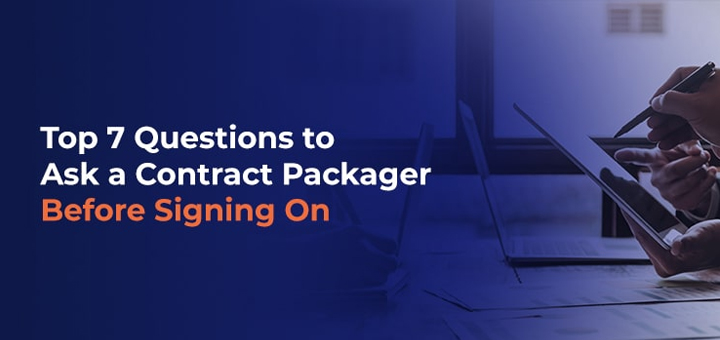The contract packaging industry is projected to experience significant growth over the next few years, achieving a market value of 119 billion U.S. dollars by 2025. As a product manufacturer, you’re probably aware that your contract packagers are a vital part of your company’s success. Contract packagers, also known as copackers, provide businesses with packaging services, equipment, labor or facilities to create the best possible packaging for their products.
With the right contract packager, you can experience fast turnaround times, increased efficiency and even cost savings. However, not all contract packagers are created equal. That’s why it’s vital to know what questions to ask a contract packager before appointing one for your company.
Through this comprehensive guide, you’ll learn what you need to know before signing on with a contract packager.
WHAT QUESTIONS SHOULD YOU ASK A CONTRACT PACKAGER BEFORE SIGNING ON?
Choosing a contract packager for your manufacturing company means making a decision that will significantly impact your supply chain, top and bottom lines, and consumer and retailer relationships. A skilled and experienced organization will streamline your operations, while an unreliable contract packager can create challenges for your business. With so much weighing on your decision, it’s crucial that you outsource a company you can trust to optimize your supply chain.
Before settling on a contract packager for your business, consider asking the following questions to ensure that you’re making the right choice.
1. What Types of Equipment Do You Have?
There are dozens of packaging machines in the contracting packaging industry, from pallet wrappers to shrink sealers to case erectors. Each type of equipment differs across various classifications, including:
- Function: Packaging machines can be either single- or multi-function.
- Usage: Equipment is categorized as either inner or outer packaging machines. Inner machines package materials, while outer machines perform secondary actions, such as wrapping, cartoning, shrinking and box-filling.
- Packaging material: Different machinery is designed to handle and separate different materials, such as boxes, cartons, bags, bottles and film.
- Package style: You can classify packaging equipment by package style, such as pillow, sachet, zipper, pouch, pillow and more.
- Automation mode: Packaging machines can either be automatic, manual or semi-automatic.
- Product type: There are packaging machines designed for packaging solid, liquid and paste products.
- Industry: Some equipment is more better suited for certain industries than others.
With so many machine configurations, it’s essential that your contract packager has the equipment that’s best suited for your product packaging needs. Ensure their machine models are proven to minimize downtime and increase operational flexibility for the highest-quality results.
2. What Are Your Capabilities?
All contract packagers have varying production capabilities. The key to getting the most value from your investment is choosing a company with a versatile range of capabilities. Examples of operational capabilities that may be beneficial for your business include:
- Automation: Labor can be costly in contract packaging. That’s why companies that use automation instead of manual processes are often the more cost-effective choice.
- Data distribution: Access to inventory data is vital for any manufacturer. Make sure your prospective contract packager has the technology needed to produce comprehensive and accurate reports, including an efficient enterprise resource planning (ERP) system and warehouse management system (WMS) that will integrate with your software.
- Labeling system: Labeling capabilities are necessary for product tracking purposes, providing information about the source and date of packaging.
- Cleanroom: If you manufacture products that require sterilization, such as medical devices, make sure your contract packager has a cleanroom. Cleanroom technologies minimize contamination like dirt, dust and microorganisms by providing a controlled environment containing positive filtered or incinerated air pressure.
- Sterilization: Some companies that don’t have cleanrooms may have other sterilization capabilities, such as steam, gamma or E-beam sterilization. These technologies mean you don’t have to pay additional costs for outsourced sterilization.
3. How Long Have You Been in Business?
You should ensure that your contract packager has the experience level necessary to meet your business needs. It’s wise to look for a company that’s been around for decades rather than years.
The longer an organization has participated in the contract packaging industry, the more challenges they’ve learned to face and the better they’ve optimized their processes accordingly. In addition, companies that have been around longer have a greater chance of staying in business in the long term.
4. Where Are Your Facilities Located?
It’s essential that your contract manufacturer has a wide-reaching network of facilities positioned across the country. Without a broad North American footprint, you risk business disruptions, reduced flexibility and higher transportations costs.
It’s helpful to choose a packager that can bring their operations into your distribution center while using their own facilities to optimize transportation and handle any product overflow or backup. Your contract packager should also have facilities in key locations, such as Canada and California, as these areas can become expensive without the right coverage.
5. What Is Your Production Capacity?
As your business grows, it’s crucial that you use a packaging company that’s prepared to take on the challenges that come with this expansion. You can gauge how equipped a contract packager is to support you throughout your business growth by asking about their production capacity. The larger company’s capacity, the better you can trust that they have the means to sustain you.
6. Do You Perform Packaging Design Services?
The most dependable contract packaging companies treat order fulfillment and packaging design as one entity. That’s because the graphic and structural elements of product packaging directly correlate with fulfillment. When you split these operations between multiple companies, you have to mediate between all parties involved, which can be complicated and time-consuming — especially for jobs that are larger in size and scope.
With a contract packager that handles both order fulfillment and package design, you can trust that they will undertake all elements of both processes in-house. These integrated operations save you time and money while streamlining operations. Having packaging design and fulfillment under one roof can also lead to major design improvements that wouldn’t occur in separate facilities.
7. Can You Store and Track Products?
Packaging companies with the ability to store, ship and track your product inventory directly from their facilities can help you better manage floor space in your facility. It’s also beneficial that your contract packager has reliable materials resource planning (MRP) software with labeling capabilities to track all aspects of your products, including manufacturing and packaging sources and dates. These systems deliver valuable insights and help companies better handle their inventory.
PARTNER WITH TRUSTED AND EXPERIENCED CONTRACT PACKAGERS TODAY
If you’re looking for a reliable contract manufacturer with advanced retail packaging capabilities and extensive industry experience, QPSI is your solution. As leaders in the contract packaging industry for over 40 years, it’s our goal to provide customers with quality services and solutions on time and at the most competitive prices. We use our streamlined approach to help companies achieve their goals while relying on our process of continuous improvement.
Contact us for more information on our contract packaging services today!







